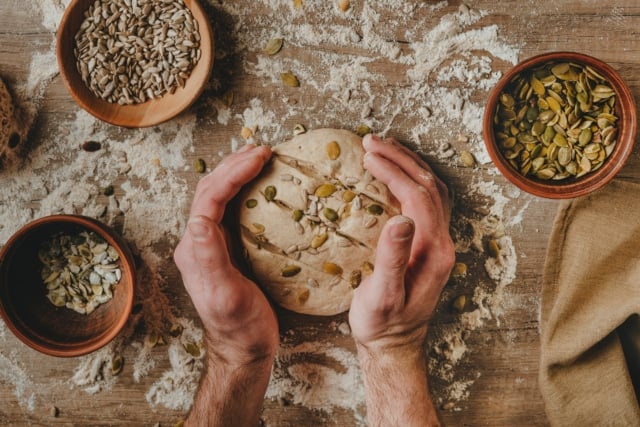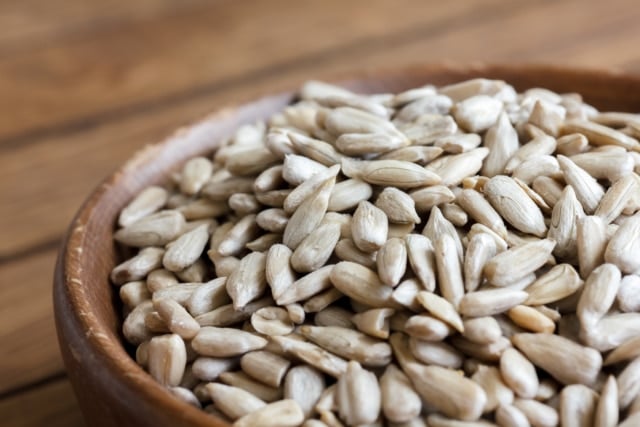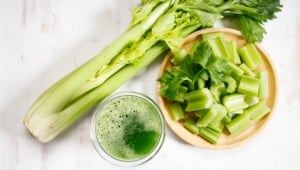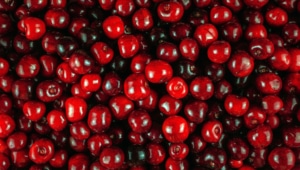11 Health Benefits of Sunflower Seeds & 3 Recipe Ideas

Sunflower seeds have an exceptionally long history. They’ve been much loved for many thousands of years. As such, they’ve long been known for their health benefits and many helpful nutrients. Read on to learn everything about the health benefits of sunflower seeds.
Sunflower seeds are an ancient superfood, and adding sunflower seeds to your diet will be beneficial to your body and mind in a variety of ways.
How, you ask? In this article, we’ll explore just what is so good about sunflower seeds. We’ll look into what our ancestors already knew even if we’ve slightly forgotten it.
We’ll also look into what amount of sunflower seeds you should have to reap their healthful benefits. Your body, mind, and even your skin will thank you.
Interesting Facts about Sunflower Seeds

Interesting Facts about Sunflower Seeds
Sunflowers are actually made up of thousands of teeny flowers.
The little florets in the center of the larger flower contain both female and male sex organs, and each one produces a seed. This also means that sunflowers can both take pollen from other plants as well as self-pollinating
There are around 70 different sunflower species. There are a vast variety of sizes, colors, and shapes, each different, but each edible.
Sunflowers can actually track the sun. They change the way they face depending on where the sun is in the sky, and will ‘follow’ it during the day. This does change when flower heads get particularly large and heavy, and at this point flowers won’t ‘track’ quite as well anymore.
Origin and Where Sunflower Seeds Grow

Origin and Where Sunflower Seeds Grow
Sunflowers were first grown in Northern America around 5000 years ago. This puts them on a similar level as corn, tomatoes, and potatoes. Nowadays, America is the world’s number 10 producer of sunflower seeds. Most of these are grown in North and South Dakota.
Sunflower Seeds Season
In the Northern parts of the US sunflowers grow between April and mid-June. They’re best planted after any risk of frost has passed in the Spring. Ideally the soil temperature should be at least 50 F for your flowers to grow.
Nutritional Facts, Calories and Protein of Sunflower Seeds

Nutritional Facts, Calories and Protein of Sunflower Seeds
Up to two tablespoons per day are a good amount of sunflower seeds if you want to reap the benefits but not add too many extra calories to your daily diet.
Two tablespoons contain around 102 calories. Sunflower seeds are calorie-dense, but also dense in nutrients and beneficial compounds such as plant sterol.
They contain vitamins such as vitamin B6, vitamin C, vitamin E, choline, folate, niacin, pantothenic acid, thiamine, and riboflavin.
Sunflower seeds also have minerals such as magnesium, calcium, manganese, iron, potassium, phosphorus, zinc, and sodium.
Sunflower seeds are unique as a complete protein, which means they contain all of the most essential amino acids.
Lastly, they’re high in vitamin E and selenium, two important antioxidants that can fight free radicals in your cells and protect you against a variety of ailments and diseases.
Health Benefits of Eating Sunflower Seeds

Health Benefits of Eating Sunflower Seeds: Why It Is So Good for You
Sunflower seeds boast plenty of health benefits. They’ve been around for thousands of years and are renowned for being a real superfood. Below are just some of the many benefits you may get from adding sunflower seeds to your diet.
Can Boost Heart Health and Reduce High Blood Pressure

Can Boost Heart Health and Reduce High Blood Pressure
The magnesium content in sunflower seeds is particularly helpful when it comes to reducing blood pressure.
Meanwhile, the unsaturated fatty acids in these super-seeds help your body to make a compound which relaxes your blood vessels.
Sunflower seeds, alongside seeds in general, have been linked to lower rates of heart disease and high blood pressure.
May Reduce Levels of Bad Cholesterol
Linoleic acid, an unsaturated fatty acid in sunflower seeds, helps your body lower levels of bad cholesterol naturally. You may wish to try your hand at making sunflower seed butter at home, which you can use as a super healthy peanut butter alternative that’s good for your heart.
Can Improve Your Immune System

Can Improve Your Immune System
The many vitamins and minerals in sunflower seeds are helpful when it comes to supporting your immune system. This in turn helps you to better fight viruses.
The vitamin E, zinc, and selenium content in sunflower seeds is particularly beneficial for your body’s maintenance of immune cells.
May Help Manage Blood Sugar Levels

May Help Manage Blood Sugar Levels
Studies have shown that eating around 1 oz of sunflower seeds per day can reduce your fasting blood sugar levels by around 10 percent.
This is apparently at least in part due to the chlorogenic acid content in sunflower seeds.
Chlorogenic acid is a plant compound, which is a type of phenolic acid also found in coffee.
May Reduce Your Risk of Cancer

May Reduce Your Risk of Cancer
Sunflower seeds are rich in plant sterol, which is said to help protect against some cancers. There appears to be some disagreement on whether or not it’s especially good for breast cancer, though most sources recommend it.
Other cancer-fighting seeds appear to be sesame seeds, so pair sunflower seeds with these for a good health-boosting snack.
Can Boost Your Brain Function

Can Boost Your Brain Function
The vitamin B6 content in sunflower seeds is particularly good when it comes to improving your mood, concentration, and memory function.
Vitamin B6 helps release norepinephrine and serotonin in your body.
Serotonin is particularly important when it comes to your mood, sleep, and even sexual desire. Norepinephrine, in small doses, helps you to feel happy.
May Help with Weight Loss

May Help with Weight Loss
Sunflower seeds are a good source of both fiber and protein. This has a fulness effect on your body and can make you reduce your overall food intake.
The reduction of calories you consume as a result of this is what may eventually lead to weight loss.
With that said, sunflower seeds are high in calories themselves, so you’ll need to strike a good balance to achieve weight loss.
Can Increase Your Energy Levels

Can Increase Your Energy Levels
There is a large amount of protein in sunflower seeds, as well as a selection of other energy-boosting vitamins and minerals. The vitamin B and selenium in sunflower seeds helps you to feel energized.
Thiamine, another vitamin in sunflower seeds, helps your body to convert the food you eat to energy, keeping you feeling alert and active.
Can Help Boost Your Iron Levels

Can Help Boost Your Iron Levels
Just 1 oz of sunflower seeds can nourish your body with 10 percent of its daily requirement of iron.
This is particularly good news for pregnant women who may suffer from pregnancy-related anemia.
Other seeds such as sesame, pumpkin, and flaxseed are also very high in iron, so making healthy seeded bread is a great idea if you’re lacking this important mineral.
May be Beneficial for Your Skin and Hair

May be Beneficial for Your Skin and Hair
Just a small amount of sunflower seeds may boost your skin and hair’s health.
This is partly due to the seeds’ vitamin E content, which is helpful at protecting your skin cells from damaging free radicals.
Free radicals are responsible for a lot of signs of premature aging. Enhancing your diet with foods such as sunflower seeds is one of the best ways to maintain youthful looks.
Can Reduce Inflammation in Your Body

Can Reduce Inflammation in Your Body
Adding sunflower seeds to your diet may offer anti-inflammatory properties. This is largely due to the seeds’ content of flavonoids, vitamin E, and various plant compounds that may help reduce inflammation in your body.
This in term can help with both short-term and chronic inflammation, making sunflower seeds a helpful superfood when it comes to battling all sorts of ailments.
Potential Risks of Sunflower Seeds

Potential Risks of Sunflower Seeds
As with any health food, sunflower seeds may also incur some risks. These are largely to do with overconsumption, so moderation is usually the answer. Here is a list of the most commonly found side effects when it comes to eating sunflower seeds.
Excess Consumption May Cause Stomach Problems
Eating too many sunflower seeds could cause stomach upset, nausea, diarrhea, or constipation. Generally, just cutting back and eating less will quickly resolve this issue.
May Cause Allergic Reactions

May Cause Allergic Reactions
Just like any other food, you could be allergic to sunflower seeds. It is an uncommon allergy, and is sometimes put down to the protein retained in sunflower oil.
If you do suffer from a sunflower seed allergy, you may wish to carefully check ingredients on pre-made foods, as sunflower oil is frequently used.
Eating Too Many Can Cause Weight Gain
Sunflower seeds can make you feel fuller for longer, but they do contain a lot of calories. Adding too many to your diet could have the opposite effect of what you’re aiming for.
Are Sunflower Seeds in Pregnancy Good For You?

Are Sunflower Seeds in Pregnancy Good For You?
Sunflower seeds make for a wonderful pregnancy snack. They’re an excellent source of important nutrients including vitamin E, folate, potassium, and omega-3 fatty acids.
They’re helpful for protecting cell membranes as well as supporting tissues and blood cells. Their high folic acid content is particularly good for you, as folic acid can help protect against birth defects including spina bifida.
One great way to enjoy sunflower seeds is to make granola bars with them. Add in different seeds and dried fruit, and enjoy as part of a healthy pregnancy diet.
Some of the best foods for pregnancy include whole grains, nuts, and seeds. Dried fruits such as apricots, figs, and dates are particularly good, too.
Can Dogs and Cats Eat Sunflower Seeds?

Can Dogs and Cats Eat Sunflower Seeds?
Sunflower seeds are fine for dogs and cats, so long as you shell them before feeding them to your furry friends. The shells can cause blockages in the intestines of smaller four-legged pets.
Shelled sunflower seeds are a good source of protein, vitamins, and minerals. Their high content of fiber can actually promote better digestion.
With that said, only use them sparingly as they are high in calories and always buy unsalted sunflower seeds.
Delicious Recipe Ideas with Sunflower Seeds

Delicious Recipe Ideas with Sunflower Seeds
Sunflower seeds are a healthy addition to your diet as well as a versatile one. They’re great for boosting your overall health, particularly when added to some otherwise healthy recipes. Below are a few of our favorite ways to incorporate sunflower seeds into your food.
Homemade Sunflower Seed Bread

Homemade Sunflower Seed Bread
It’s widely known that homemade bread is much better for you than anything store bought could ever be.
That’s largely because you control the ingredients and there aren’t any artificial additives. As such, homemade sunflower seed bread is a great thing to make yourself.
Add some sunflower seeds and pumpkin seeds to your preferred bread recipe — you can even use sourdough for its added health benefits.
Bake until done and as browned as you’d like it to be, and enjoy. Top tip: you can slice your bread and freeze the slices if you find yourself using less than expected.
Sunflower Seed Chocolate Bites

Sunflower Seed Chocolate Bites
When we came across this simple recipe, we knew we had to make it. All you need is sunflower seeds, some salt, maple syrup, and dark chocolate.
The seeds are combined with the salt and maple syrup, before being pressed into a small cookie cutter to make disc shapes.
These are then baked for 15 to 20 minutes, before being dipped in the melted dark chocolate. They’re not overly sweet and make for a reasonably healthy snack you can easily whip up at home.
Vegan Sunflower Seed Cheese

Vegan Sunflower Seed Cheese
This is a hugely popular recipe amongst vegans and vegetarians.
It’s made with a mixture of softened raw sunflower seeds, nutritional yeast, lemon juice, refined coconut oil, white miso, garlic powder, smoked paprika, salt, and turmeric.
It’s a brilliant substitute for a somewhat creamy cheese and works well with bread or mixed into dips. Besides the health benefits of the sunflower seeds, you also have some wonderful perks of using nutritional yeast.
Nutritional yeast is known for boosting your energy, supporting your immune system, and helping promote overall better health.
Tips for Using Sunflower Seeds

Tips for Using Sunflower Seeds
Sunflower seeds are great for your health and wellbeing. Here are some more tips for how best to look after them, particularly if you’re looking to grow your own. Keep these saved somewhere for the next time you need them.
How to Store Sunflower Seeds

How to Store Sunflower Seeds
You’ll want to store both roasted and raw sunflower seeds in containers that are air-tight.
Keeping them in your pantry is fine, and they’ll stay good for around 2 to 3 months, possibly longer. Keeping your pantry cool and dry is essential to extending their shelf-life for as long as possible.
How to Harvest Sunflower Seeds from Your Garden

How to Harvest Sunflower Seeds from Your Garden
Any variety of sunflower produces edible seeds, though you’ll want to opt for larger ones which produce the white and gray striped seeds.
These are bigger and generally taste better than smaller types.
Wait until your sunflowers have died off and the flowers have turned brown. Place the flowers face side down in a container to catch any loose seeds.
How to Shell Sunflower Seeds Quickly

How to Shell Sunflower Seeds Quickly
One of the simplest ways to quickly shell multiple sunflower seeds is to place them in a bag, then gently roll over the bag with a rolling pin.
You want to crack the shells a little, but ideally without damaging the seeds inside too much.
Next, place the contents of the bag in a pot of water and remove the shells, which will float to the top, using a spoon. Dry the seeds and enjoy.
- Tomato Juice. Health Benefits + Tips.
- Asparagus. Benefits for Your Health.
- Mango. Benefits and Side Effects.
- Onions. Health Benefits and Tips for Use.
- Spinach. Benefits and Exctiting Facts.
- Peanuts. Health Benefits & Tips and Hacks.




